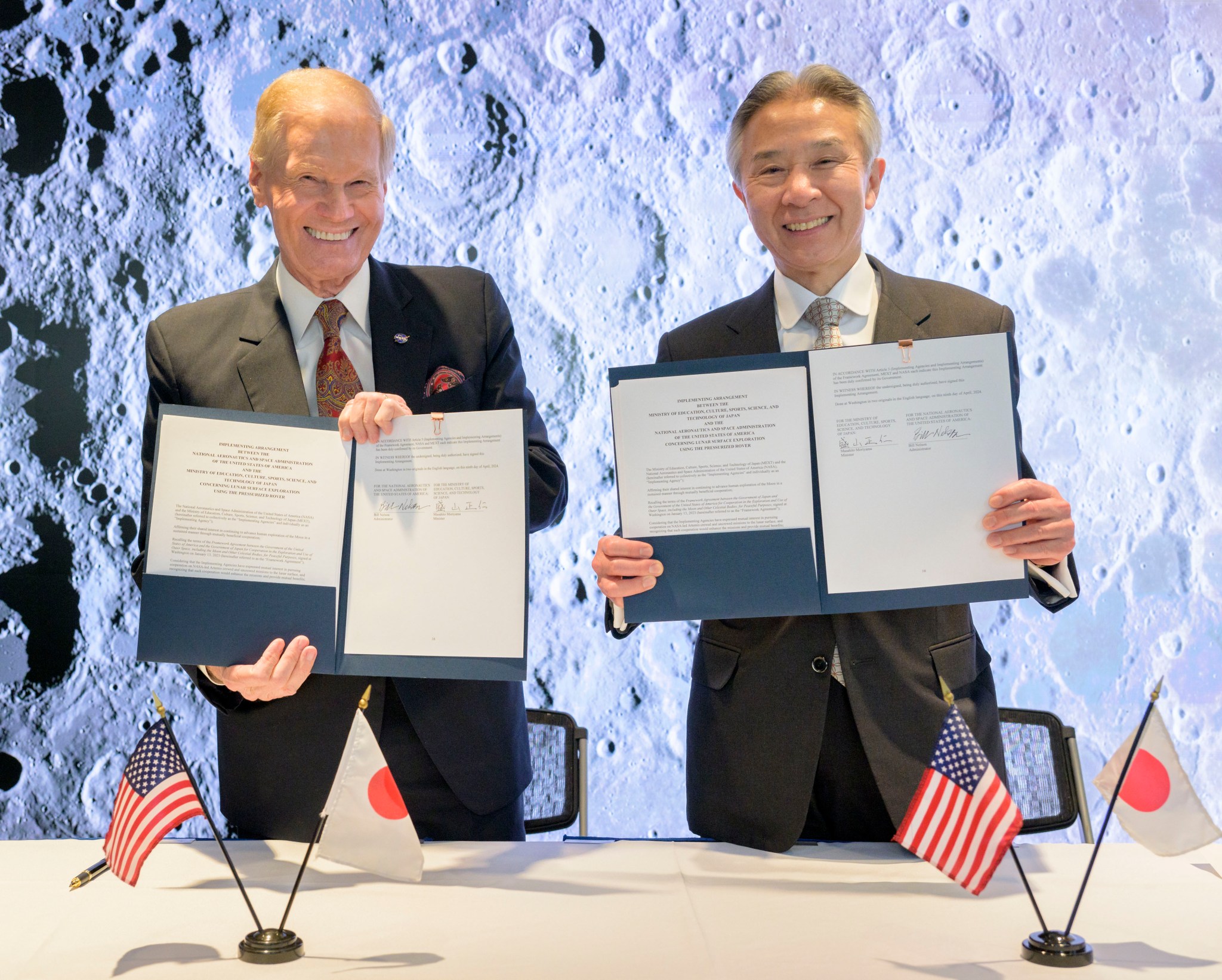|
April 10, 2024
NEWS RELEASE: 24-052 NASA, Japan Advance Space
Cooperation, Sign Agreement for Lunar Rover
NASA Administrator Bill Nelson, left, and Japan’s Minister of Education, Culture, Sports, Science and Technology Masahito Moriyama, hold
signed copies of an historic agreement between the United States and Japan to advance sustainable human exploration of the Moon, Tuesday, April 9, 2024, at the NASA Headquarters Mary W. Jackson Building in Washington. Under the agreement, Japan will design,
develop, and operate a pressurized rover for crewed and uncrewed exploration on the Moon. NASA will provide the launch and delivery of the rover to the Moon as well as two Japanese astronaut missions to the lunar surface. Photo Credit: (NASA/Bill Ingalls) NASA Administrator Bill Nelson and Japan’s Minister of Education, Culture, Sports, Science and Technology (MEXT) Masahito Moriyama have signed
an agreement to advance sustainable human exploration of the Moon. Japan will design, develop, and operate a pressurized rover
for crewed and uncrewed exploration on the Moon. NASA will provide the launch and delivery of the rover to the Moon as well as two opportunities for Japanese
astronauts to travel to the lunar surface. Today, President Biden and Prime Minister Kishida also announced, “a shared goal for a Japanese national to be the first non-American astronaut
to land on the Moon on a future Artemis mission, assuming important benchmarks are achieved.” The pressurized lunar rover is intended to enable astronauts to travel farther and work for longer periods on the lunar surface.
The signing took place April 9 at NASA Headquarters in Washington. Along with Nelson and Moriyama, JAXA (Japan Aerospace Exploration Agency) President Hiroshi Yamakawa also participated in the signing. “The quest for the stars is led by nations that explore the cosmos openly, in peace, and together. This is true for the United States and Japan
under the leadership of President Biden and Prime Minister Kishida,” said Nelson. “America no longer will walk on the Moon alone. With this new rover, we will uncover groundbreaking discoveries on the lunar surface that will benefit humanity and inspire the
Artemis Generation.” An enclosed and pressurized rover will enable astronauts to travel farther and conduct science in geographically diverse areas by serving as
a mobile habitat and laboratory for the astronauts to live and work for extended periods of time. It will be able to accommodate two astronauts for up to 30 days as they traverse the area near the lunar South Pole. NASA currently plans to use the pressurized
rover on Artemis VII and subsequent missions over an approximate 10-year lifespan. “It was an honor to sign the historic implementing arrangement that will be long remembered as the symbol of the new era of Japan-U.S. partnership
for the lunar exploration,” said Moriyama. “Under the partnership stronger than ever, we will drive the initiative together with JAXA, including the development of the pressurized rover that vastly extends the exploration capability on the lunar surface, to
realize the shared goal for Japanese and American astronauts to, together, explore the moon.” The arrangement falls under the “Framework Agreement Between the Government of Japan and the Government of the United States of America for Cooperation
in Space Exploration and Use of Outer Space, Including the Moon and Other Celestial Bodies, For Peaceful Purposes,” which was
signed
in January 2023 and recognizes the nations’ mutual interest in peaceful exploration. The framework agreement facilitates a broad swath of joint activities between the countries, including space science, Earth science, space operations
and exploration, aeronautical science and technology, space technology, space transportation, safety, and mission assurance, and much more. In addition to the agreement for lunar surface exploration, the partners will build on the framework agreement with
future agreements for Japan’s participation in NASA’s Dragonfly
mission and the Nancy Grace Roman Space Telescope.
The U.S. and Japan also intend to collaborate on JAXA’s Next-generation Solar-observing Satellite, SOLAR-C, which will investigate the mysteries of solar atmospheres by conducting observations of ultraviolet radiation from the Sun. “The pressurized rover will be a powerful contribution to the overall Artemis architecture as Japan and the U.S. go hand in hand with international
and industry partners to the lunar surface and beyond,” said Yamakawa. “JAXA is ready to assist MEXT and push this forward with our science and technological expertise to establish sustainable human presence on the Moon.” Under the
Gateway
Implementing Arrangement signed in 2022, NASA will also
provide an opportunity for a
Japanese astronaut to serve as a Gateway crew member on a future Artemis mission
and Japan will provide Gateway’s environmental control and life support systems and cargo transportation. Through Artemis, NASA will land the first woman, first person of color, and its first international partner astronaut
on the Moon, make new scientific discoveries, and explore more of the lunar surface than ever before for the benefit of all.
Learn more about NASA’s Artemis campaign at: —end— TO RECEIVE NASA NEWS RELEASES NASA news releases and other information are available automatically by sending an e-mail to hqnews-join@xxxxxxxxxxxxxxxxxxxx (no
subject or text in the body is required). To unsubscribe from the list, send an e-mail message to hqnews-leave@xxxxxxxxxxxxxxxxxxxx (no
subject or text in the body is required). |

